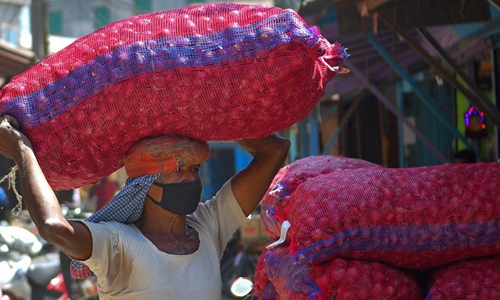
A labour carries a gunny bag containing onions during the lockdown due to the COVID-19 outbreak in the outskirts of Agartala, India's northeast state of Tripura, March 30, 2020. (Str/Xinhua)
While the COVID-19 outbreak is causing disruption to the Indian economy, which has already experienced a significant slowdown in the past few quarters, the country is expected to cooperate with China to facilitate trade via efforts like working out mechanisms to reduce quarantine delays at ports, an Indian business representative said.
The slowdown in manufacturing activity in China, other Asian markets, Europe and the US due to the viral epidemic is hitting Indian exports, Atul Dalakoti, executive director for China at the Federation of Indian Chambers of Commerce and Industry, told the Global Times.
"China is a major market for many Indian products like seafood, petrochemicals, gems and jewelry and the outbreak of coronavirus has adversely impacted exports of these items to China," Dalakoti said.
For instance, the Indian fisheries sector is anticipated to incur a loss of more than $171,000 due to the fall in exports to China, according to Dalakoti.
India exports 36 percent of its diamonds to China. The cancelation of four major trade events between February and April is likely to cause an estimated loss of $1.05 million to $1.3 million in business opportunities for the city of Jaipur alone, he said. Jaipur, famous for its jewelry, is the capital and the largest city in Rajasthan.
Trade between China and India fell 12.4 percent year-on-year to 85.17 billion yuan ($12 billion) in the first two months amid the virus outbreak, according to the latest Chinese customs data.
From January to February, China's exports to India were 67.1 billion yuan, down 12.6 percent on a yearly basis and imports from India droped 11.6 percent to 18 billion yuan.
Since India is a large exporter of agricultural products, the knock-on effect due to the pandemic will disrupt trade in agricultural markets across the whole Asia-Pacific, Lan Jianxue, deputy director of the Department for Asia-Pacific Studies at the China Institute of International Studies, told the Global Times on Thursday.
Global prices of goods like cotton will be affected in the second half if the virus cannot be contained in India, Lan said.
The number of confirmed global COVID-19 had exceeded 900,000 as of press time and there were about 2,000 confirmed cases in India, according to Johns Hopkins University.
Indian Prime Minister Narendra Modi ordered a 21-day nationwide lockdown starting midnight March 25.
India's largest slum, Dharavi in Mumbai, reported its first case of the coronavirus, economictimes.com reported late Wednesday. All nearby apartments and 90 shops have been closed.
As India is facing a wider virus outbreak, its domestic supplies are suffering. "Some sectors in India like automobiles, pharmaceuticals, electronics [and] chemical products are facing an imminent raw material and component shortage," Dalakoti said.
Active pharmaceutical ingredient shipments have started coming in for pre-manufactured stocks which were lying at ports in China, he noted, adding that imports for the new manufactured stocks were expected by the end of March or beginning of April. "This is hampering business sentiment and affecting investment and production schedules of companies in India."
Shipments from China have started to arrive, but the ships are not being allowed to unload their goods in India due to fear of contagion, Dalakoti said, noting that the Indian government should find ways to facilitate the safe and fast unloading of shipments in India.
China and India are expected to work out a mechanism to reduce quarantine delays at ports, he said, noting that availability of containers in India is also a problem which needs to be solved.
Given the mounting pressure India faces, China could offer help in combating the COVID-19 if the South Asian country has any need, since China's experience of containing the virus has been effective in a country with a large population, Lan said.
Dalakoti agreed, saying "we can learn from the experience of the Chinese which would be helpful."
Lan noted that sectors like pharmaceuticals, healthcare and non-traditional securities are likely to become new forces to drive cooperation between China and India in the near future.
China and India on Wednesday marked the 70th anniversary of the establishment of diplomatic relations.

